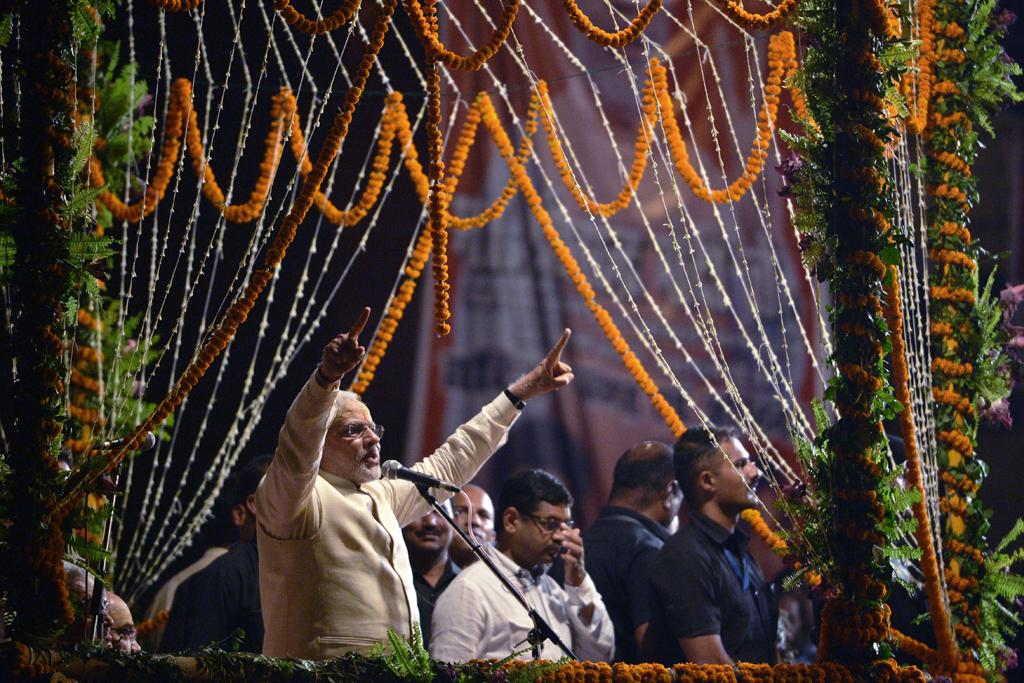Modi’s election euphoria must give way to economic reality
Indian prime minister-elect Narendra Modi addresses supporters after performing a religious ritual at the banks of the River Ganges in Varanasi on May 17, 2014.
Modi flew to Delhi's main airport from his home state of Gujarat, where served as the longest running chief minister in history, to bask in the glory of a landslide victory for his Hindu nationalist Bharatiya Janata Party.
A crowd burst through police barricades at the sight of the 63-year-old leader's cavalcade.
"Modi is our lion! He will work for the people of India, he will work for development, he will work for every Indian," shouted Om Dutt, a 39-year-old shop owner.
The BJP won the first majority in parliament for 30 years on Friday after a campaign by Modi focused on delivering new jobs, development and clean government.
The triumph redrew India's political map, and Indian shares have soared on hopes that Modi can revive a slumping economy. On Friday, he promised he could make the 21st century "India's century" within 10 years.
But analysts warn of impossible expectations.
"Indian politicians promise the earth to get elected," said economist Rajeev Malik from the CLSA investment bank.
The reality is that India's economy is growing at its lowest rate in a decade.
"There's no magic wand," warned D.K. Joshi, chief economist of credit rating agency Crisil.
For a start, India is gripped by stagflation — growth has crashed to 4.9 percent from 9 percent two years ago and consumer inflation is at a wage-eroding 8.6 percent, the highest among top emerging economies.
For another, there are still a number of no-go areas in India's economy such as its inflexible hire-and-fire labor laws which discourage employers from taking on new workers.
Infrastructure needed to underpin the industrialization process is poor in large parts of the country and a new land acquisition law has further complicated the process of buying space for new factories.
Arun Jaitley, who is tipped to be finance minister, told a small group of foreign reporters last month that there was little prospect of early reforms of the labor market or any major rollback of pro-poor welfare programs.
Reform reversals
For all his reform talk, Modi will have to contend with entrenched resistance to radical change in many quarters which could disappoint foreign companies eyeing new opportunities.
In India, and within the BJP, there remains a strong protectionist movement, resistant to opening up the still inward-looking economy to outsiders.
While the BJP promises a welcome mat to foreign investors in defense and infrastructure, the party is against a previous reform by the left-leaning Congress government to open the retail sector to foreign supermarkets.
Also, in Modi's fiefdom of Gujarat, he was able to centralize control and browbeat India's notoriously slow bureaucrats. As a national leader, he will need to build consensus, analysts say.
One huge advantage is that he will not have to deal with unruly coalition partners, but state governments will be key to making real changes on the ground.
JP Morgan's India economist Sajjid Chinoy warned against overly high expectations, noting that under India's federal system "75 to 80 percent of the problems on the ground are outside the direct jurisdiction of the central government."
"Some shovel-ready projects could be implemented which could produce a growth pop for a quarter or two," he said. "But a more sustained recovery will be far more challenging and time-consuming."
Also, although Gujarat's expansion outdistanced the India-wide average in 11 of the past dozen years, some economists say the achievement may not be all that impressive in a state known for its spirited entrepreneurs long before Modi arrived.
Many global investment houses predict growth of just 5.5 percent in 2014-15, rising to around to 6.5 percent the next year, but these forecasts might now be revised upwards.
'Breath of fresh air'
Still, the "Modi-economics" mantra of "minimum government, maximum governance" marks a watershed departure from the socialist course set by India's first premier Jawaharlal Nehru after independence from Britain.
India-born Jagdish Bhagwati, a professor at Columbia University in New York, praises the BJP leader's aim of reducing government's role as a "breath of fresh air."
Sen, who also teaches at Britain's Cambridge University, says the country is at a critical fork in the road.
"For now, election euphoria is the order of the day," said Miguel Chanco, an analyst from Capital Economics.
But markets can lose patience quickly and if the new government fails to impress rapidly, "investor optimism could soon turn to more widespread investor disillusion," drying up foreign inflows, Chanco cautioned.
Every day, reporters and producers at The World are hard at work bringing you human-centered news from across the globe. But we can’t do it without you. We need your support to ensure we can continue this work for another year.
Make a gift today, and you’ll help us unlock a matching gift of $67,000!
